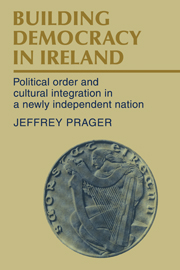 Building Democracy in Ireland
Building Democracy in Ireland Book contents
- Frontmatter
- Contents
- Preface
- Part 1 Democracy in Ireland: Theoretical and Empirical Problems
- 1 Introduction: Theoretical Considerations in the Study of Political Stability in New Nations
- 2 Irish Cultural Schisms and the Meaning of Political Disorder
- 3 The Free State Constitution and the Institutionalization of Value Strains
- Part 2 Patterns of Crisis Resolution in the Irish Free State, 1922–1932
- Part 3 The Character of Irish Democracy
- Notes
- References
- Index
1 - Introduction: Theoretical Considerations in the Study of Political Stability in New Nations
Published online by Cambridge University Press: 25 October 2011
- Frontmatter
- Contents
- Preface
- Part 1 Democracy in Ireland: Theoretical and Empirical Problems
- 1 Introduction: Theoretical Considerations in the Study of Political Stability in New Nations
- 2 Irish Cultural Schisms and the Meaning of Political Disorder
- 3 The Free State Constitution and the Institutionalization of Value Strains
- Part 2 Patterns of Crisis Resolution in the Irish Free State, 1922–1932
- Part 3 The Character of Irish Democracy
- Notes
- References
- Index
Summary
Why have so many of the newly independent nations of the twentieth century been racked by political disorder and social instability? Why have so few been successful in establishing stable, regular patterns of institutional relations that promote the well-being of their citizens and enhance their nation's position among the community of nations? Why has the ordering of their societies according to democratic principles been so elusive an achievement? These problems of instability and disorder have commanded the attention of scholars at least since the 1960s, when many nations emerged from their dependent colonial status and attempted to develop into politically independent, self-sustaining entities.
This book represents another effort to answer these questions. Yet the approach taken here differs from previous ones in at least two ways. First, rather than focusing on those societies in which instability has prevailed, I direct attention to a newly independent nation of the twentieth century – the Republic of Ireland – where a stable political order has, in fact, been successfully established. By appreciating the success of the Irish political elite in creating a stable political order, it is argued, we may gain a greater understanding of the obstacles that have prevented other new nations from following the Irish pattern. Second, and more fundamentally, the theoretical approach used to examine the accomplishment of Irish stability differs substantively from that of the vast body of modernization literature.
- Type
- Chapter
- Information
- Building Democracy in IrelandPolitical Order and Cultural Integration in a Newly Independent Nation, pp. 3 - 26Publisher: Cambridge University PressPrint publication year: 1986


